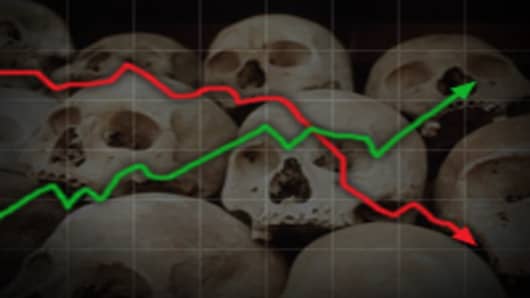After a week in which stock markets around the world suffered, analysts and strategists are predicting further gloom in the weeks ahead.
The eurozone will continue to be in focus, with no let-up for European banks after recent downgrades, share price falls, and the news that up to 20 need recapitalizing.
The 16 banks which ended up with core tier-one capital ratios of 5 percent to 6 percent during the last set of stress tests are under pressure to recapitalize earlier than planned, according to a report in the Financial Times Friday.
"It's not clear to me that these 16 banks are the only banks which need significant recapitalization," Alastair Newton, senior political analyst at Nomura, told CNBC Friday.
"The stress tests didn't address the worst-case scenario and that remains a sovereign default in the eurozone. "We don't have the EFSF agreement yet. We don't have persuasive stress tests," he added.
While markets were up slightly on Friday morning after G20 countries pledged to take any steps needed to calm the financial crisis and support European banks, before falling again, worries are far from over.
"There's a lack of transparency around what's actually in banks and which ones are in a better position," Bridget Gandy, co-head of EMEA Financial Institutions, told CNBC. "With the panic and nervousness about what's going around in the eurozone, there's a failure to distinguish among that."
"A lot of banks have shored up capital and liquidity quite considerably and this is a very different situation to going into the Lehman crisis," she added.
Despite the recent falls in valuations, Mike Lenhoff, chief strategist at Brewin Dolphin, believes that there is still some way to go.
"If you look at earnings expectations they are actually quite elevated. We could be in for a surprise on the surprise," he told CNBC Friday. "Even if valuations are historically very attractive, that might still not be the right time to invest. Until markets are happy with valuations we will have a very unsettled background."
"They haven't gone far enough for the current market and for current market expectations," Gandy agreed.
The lack of resolution on the Greek debt crisis is one factor affecting markets, which are still worried about the prospect of the heavily indebted Mediterranean country defaulting on its debt repayments, particularly if the rest of the eurozone governments struggle to pass planned changes to the European Financial Stability Facility (EFSF), the bailout fund.
The Greek finance minister Evangelos Venizelos reiterated his country's commitment to meeting the terms of its latest austerity package Friday, despite protests on the streets of Athens at the cuts.
"The Greeks don't need it (the bailout) for the reason that market are thinking – to meet their international obligations. They need a deal to pay public sector workers and to make welfare payments," Newton said.
"If Greece doesn't get money I think you are looking at an explosion on the streets of Athens which could bring down the government and lead to the default scenario which is the worst case scenario."
He added that this "remains a real possibility" although he believes that Greece will get its bailout. "They are supposed to raise 5 billion euros ($6.7 billion) through privatizations this year but so far only 10 percent of that has been done, and that gap's not going to get closed in a hurry."
"What the market needs is some certainty as to what the outcome will be," said Gandy, who believes that the eurozone crisis will get resolved and the euro will stay as it is.
"It doesn't make any political or commercial sense to let that (the end of the euro) happen. The problem is that the politicians have to agree."
The bond markets have also remained unsettled as the eurozone crisis continues, particularly for countries such as Italy.
"The thing that really bothers me is the bond market," said Lenhoff. "You have got bond yields that aren't a million miles away from Japanese levels. I'm concerned that the bond markets are suggesting that if we dip into another recession there might be great problems coming out of it again."



